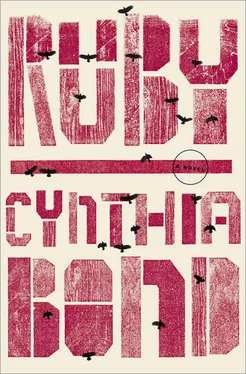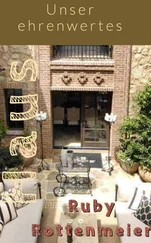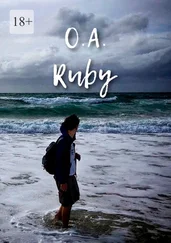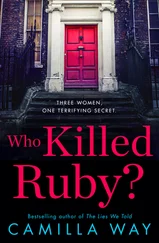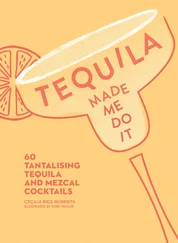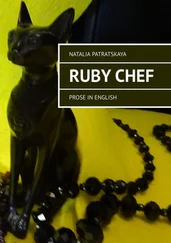It was 1963 and a world full of Negroes were making their way to Washington, D.C., to stir some change into the batter of the world. Taking trains, buses, some stuffed into the backs of pickups and some riding their thumbs, hitching five, six hundred miles. Like a lone salmon Ruby had taken the road south.
She should have known when the train stopped in Shreveport, Louisiana, instead of Lufkin, Texas, that she had overshot her Liberty.
But Ruby had been mean behind the train’s window. A low steady buzz shooting through her body. A voltage overdose that had amplified her spite and made it impossible to notice anything as benign as the world rolling and flashing in front of her. Instead she had twisted matchbook covers, unpeeled cigarette butts and shredded the moist filters. She had not spoken to the oozing woman across the aisle, although she had been given gentle leads to do so from the woman’s cow eyes, from her chubby hand waving a chicken drumstick like a baton, holding out the grease-stained bag as a communal offering. Ruby had shaken her head no in one clean glide. Ruby’s smile had been a wince. Even her hellos had been a reproach.
She’d sniffed at the elderly conductor as he walked by, silently impugning his personal care and hygiene. He had pretended not to notice, but the next time Ruby saw him he’d smelled strongly of balsam.
Ruby had not suspected that she was off-course until the conductor called out “LIB-er-ty next stop, LIB-er-ty,” and something tickled her. That something prompted her to truly look out the window. When she saw the flat prairie land of Central Texas instead of the piney woods, a panic rose then settled in her chest. She suddenly remembered the road to Liberty. Catch the Carolina South to Lufkin, Texas, change to the Buxton Limited until you reach Newton. Then take the Red Bus the thirty-seven miles to Liberty. She had not followed the bread crumbs she’d left over a decade ago and she had unfathomably forgotten her way home. She had only been able to spit out “Liberty,” the ticket was issued, and the train had barreled south.
Twenty minutes later, angry and confused, she pushed two fat quarters into the Red Cap’s hand as he helped her from the train. The weight of her mistake pushed her down on her luggage, where she sat and contemplated her next step.
That is how Ruby came to be sitting on the train platform amidst a fortress of new pink Samsonite bags. Her black hair swept straight and high, pressed within an inch of its life. Lipstick Persian red. The beauty mark on her right cheek darkened. The buzz in her head quieted to a hum as she secretly primped without benefit of mirror. When in distress, Ruby was certain, it was a matter of survival to look one’s best.
The last of the White folks and Negroes crisscrossed the platform to step aboard the train she had just vacated. The little stairs pulled up and the doors closed as a blue-black uniformed man walked up to Ruby, cap stiff, with a rail insignia brassed along the front. “Need help with your luggage Miss?”
Ruby raked through her purse — the Etienne Aigner purse — carefully avoiding the telegram from Maggie. The platform began to clear save a few men and women running to the train. She didn’t look at the Red Cap. Then she did. This was a man whose back had been used as a bootjack for the greater part of his life. Ruby realized that she had not breathed in this particular odor of obeisance for nearly a decade.
“Not exactly,” she answered. Her manner claimed unquestionable authority. It was one of the many things she’d learned on the Upper East Side of New York, how to use the tilt of a head, the jaunt of a chin to dictate and persuade. She found her cigarettes as the doors of the train sighed and closed. Leaving only Red Caps, the Station Master and little clusters of reunited families, lovers, White men conferring as they stepped away.
The Red Cap leaned in closer. Ruby felt the push in his voice. “Ma’am, you got somebody coming to get you?” he asked, his face creased with concern — a grandfather, an uncle, or a man with plenty of daughters.
His voice fell to a whisper, “Cuz with all this Colored March hullabaloo, Station Master ain’t gonna let no Colored woman set out here for too long without a ticket going somewheres.”
Ruby’s eyes settled on the man. The protectiveness of his voice was an affront to her. That and the bend-down-low in his carriage.
She pulled a Dunhill out of her purse. She placed the cigarette between her dark red lips, stared at the old man and waited. Ruby knew that years of habit would take his match and light the damn thing. He did just that. Ruby did not know why, but her eyes squinted in anger. She did not thank him. Just like a White woman. Just as Mrs. Gladdington had taught her — that some things were her right. That she no more had to thank the waiter or the cab driver than she would thank the air that she breathed.
Mrs. Charlise Gladdington had pulled Ruby from The Pony, a Village bar, and situated her in the maid’s quarters of her Upper East Side cooperative. Ruby was to be her companion — and that quickly, she escorted her to Bergdorf’s and brought home a world of Chanel and Emilio Pucci. Camel splashed with maroon and gold to better complement Ruby’s skin. She began taking her to the Met, the Museum of Modern Art and to quiet West Side parties where the women dressed in suits and ties. She sent Ruby, who had never gone to high school, to the City College of New York by the sheer weight of her position and the fact that she sat on the board. Ruby was one of a handful of Negro students, but the only one to be picked up by a driver at day’s end.
Ruby emptied glasses and ashtrays at the old woman’s parties, where the literati, artists and composers of the day gathered with benefactors, friends and would-be patrons. She lit cigarettes for Bukowski, Ginsberg and artist Elaine de Kooning. She brought gin and tonics to Ezra Pound, whom she had read, and Chivas on the rocks to John Hersey, whom she had not but pretended that she had.
Mrs. Gladdington’s only recompense for her largesse was the time spent reading to Ruby in the evenings, seated on the Charles Lane love seat, her clothed thigh just barely resting against Ruby’s knee.
“Miss?” The Red Cap was still standing there.
Ruby clipped her words. “I need to reach Newton, then on to Liberty Township.” The train spit and jerked to a start a few feet away.
“Liberty Township. Ain’t that that Colored Liberty by the Sabine?”
“Yes.”
“Ain’t no direct way there this time a day ’cept by car, Miss.”
“I don’t have a car. When is the next train?”
“Won’t be a train going that way ’til morning lest you catches the one you jes got off. It was Beaumont bound. From there, Newton’s a Greyhound bus away.”
The train pulling away from the station spit a spark of malice that landed in the tinderbox of Ruby’s throat. It conjured a wall of black soot and flames that filled her mouth, making it difficult for her to speak in full sentences.
“Is there a — where can I — is there a hotel I might—”
“Ain’t no place like that round here, Miss.”
Of course there isn’t , Ruby thought. Of course . Ruby realized that she had been out of the South for too long. She looked past the man at the slick green awnings, the red of the benches and the pinched face of the Station Master when his gray eyes landed upon her. It didn’t matter that she wore an original Mary Quant sundress, sky blue linen. It didn’t matter that she had winced at the spreading Negroes around her — sweating under flowered hats as they had stepped around her to get to the Colored car. None of that mattered. In his eyes she would always be a nigger. One he might be more likely to want to fuck, but a nigger all the same.
Читать дальше
